Activities
Luise Koch Presents Research at European Parliament Dialogue on Digital Safety
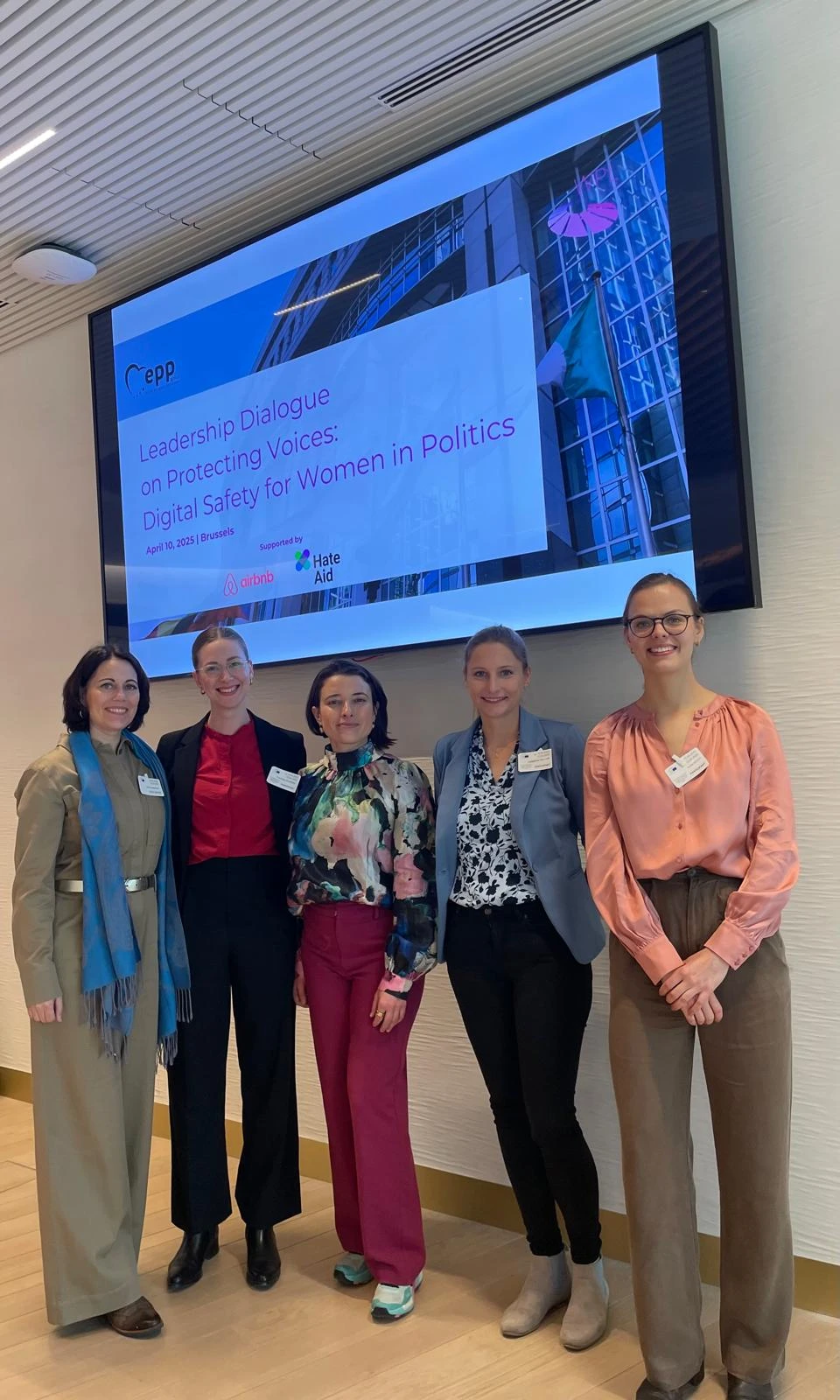
On 10 April 2025, Luise Koch from the Professorship of Global Health took part in the Leadership Dialogue on Digital Safety and Women in Politics at the European Parliament, co-hosted by Women Political Leaders, MEP Paulo do Nascimento Cabral, and supported by HateAid and Airbnb.
As co-author of the recent TUM-HateAid study “Angegriffen & alleingelassen”(Link: https://osf.io/j4stx/), Luise presented key findings on the impact of digital violence on politically active individuals -beyond elected officials to include activists, journalists, and public commentators. The study’s mixed-method design and gender comparison revealed striking differences in how violence is experienced and its consequences: over one in five women considered leaving politics due to online abuse.
By including politically active individuals not yet in office, the study offers a broader lens on how digital violence shapes who enters and stays in public life. Luise contributed a research-based perspective to the high-level dialogue, highlighting the importance of data-driven policy responses.
The roundtable also addressed the implementation of Directive (EU) 2024/1385 and the Digital Services Act, with a strong emphasis on the role of male allies, digital resilience training, and the need to ensure that online political spaces remain inclusive - rather than dominated by fear or hostility.
Luise Koch conducts data dissemination visit in Brazil
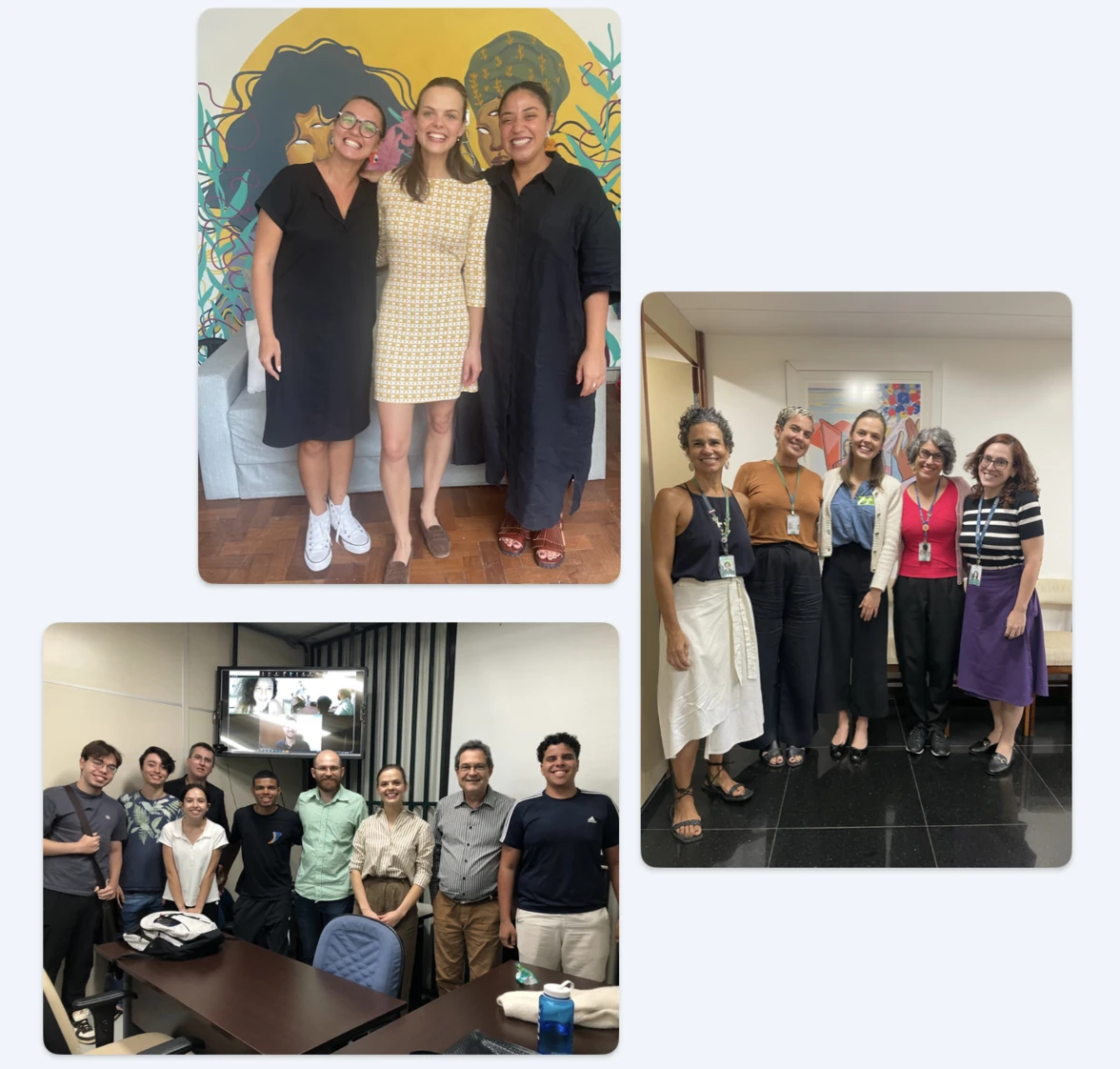
From January 30 to February 13, 2025, Luise Koch conducted a data dissemination visit in Brasília and São Paulo, engaging with policymakers, researchers, and civil society actors on digital violence and its impact on politically active individuals. Taking place at the conclusion of the Misogyny 2.0 project, the visit provided a key opportunity to present findings and discuss their practical applications for policy and advocacy.
Discussions with Ana Claudia Oliveira and Cristiane Brum Bernardes (Observatório da Mulher) focused on how research can support legislative changes to protect women’s participation in politics. Further exchanges with Mapa do Acolhimento, Instituto AzMina, and VoteLGBTQ addressed strategies to combat gender-based violence and the challenges of developing AI detection tools for misogyny and homophobia. Academic discussions at Universidade de Brasília and Universidade Federal do Paraná deepened reflections on researching online misogyny and digital hate speech.
A key outcome is the collaboration with Thayna Yaredy (MeRepresenta) to finalize a report on digital violence against politically active individuals in Brazil. The visit reinforced the importance of international research collaboration in advancing knowledge and shaping effective policy responses.
Dr. Angelina Voggenreiter talks about findings on digital violence at "Die Entscheidung" in ARD.
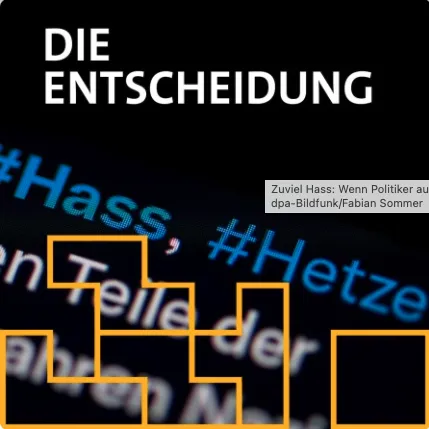
On January 31, 2025 Dr. Angelina Voggenreiter discusses the impact of digital violence on politicians in the podcast “Die Entscheidung” hosted by BR24 of ARD. You can listen to the full episode here.
Prof. Janina Steinert, Dr. Angelina Voggenreiter and Luise Koch present findings on digital violence at press conference in Berlin
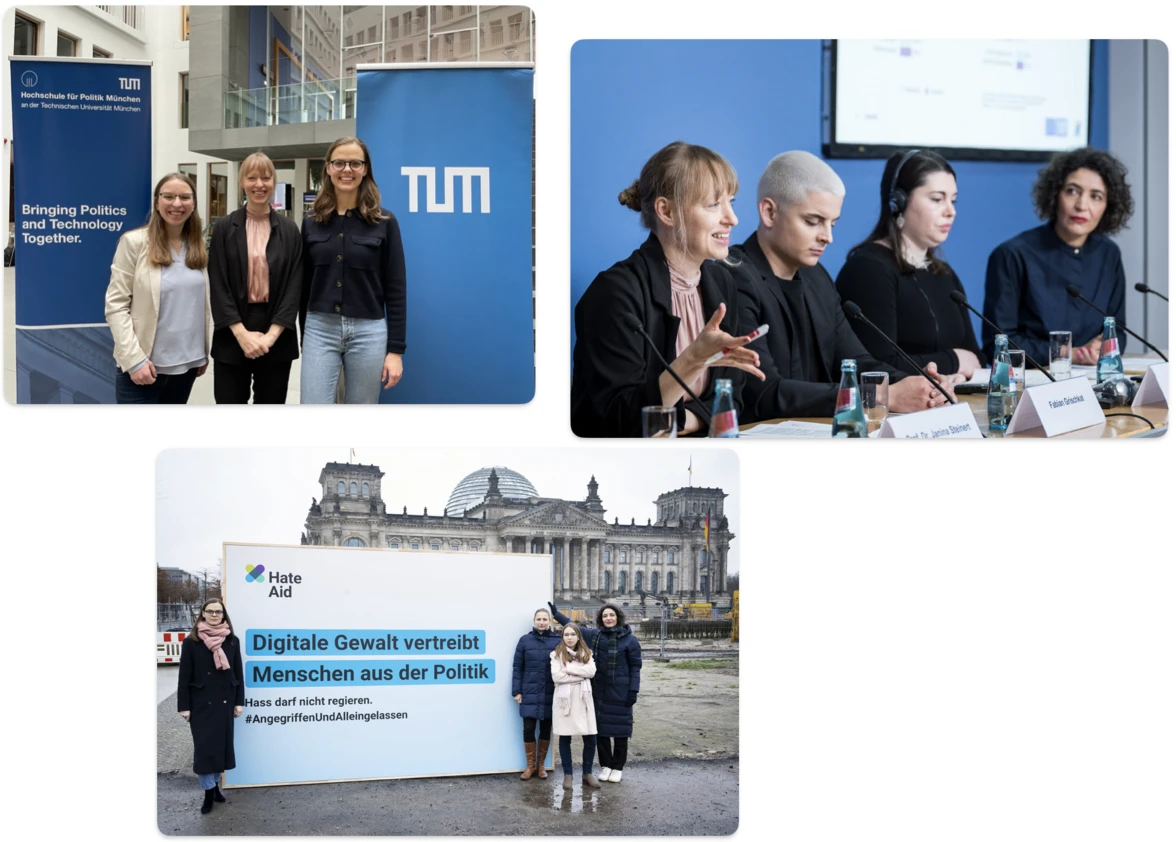
On January 15, 2025, Prof. Janina Steinert, Dr. Angelina Voggenreiter and Luise Koch presented their study “Angegriffen & alleingelassen: Wie sich digitale Gewalt auf politisches Engagement auswirkt” at the Federal Press Conference House in Berlin. The study, conducted in collaboration with HateAid and funded by the Bavarian Research Institute for Digital Transformation (bidt), highlights that over half of politically active individuals surveyed have experienced online harassment, with women disproportionately affected.
Digital violence not only impacts psychological well-being but also disrupts political engagement. The findings highlight that 66% of affected women reduced their social media use, and 22% considered leaving politics altogether due to online abuse. These dynamics underline the urgent need for systemic action from political parties, law enforcement, and social media platforms to support those targeted.
The findings emphasise the urgent need for systemic action to address the implications of digital violence for democracy and gender equality.
Read the full study here
Luise Koch wins presentation award at SVRIForum2024
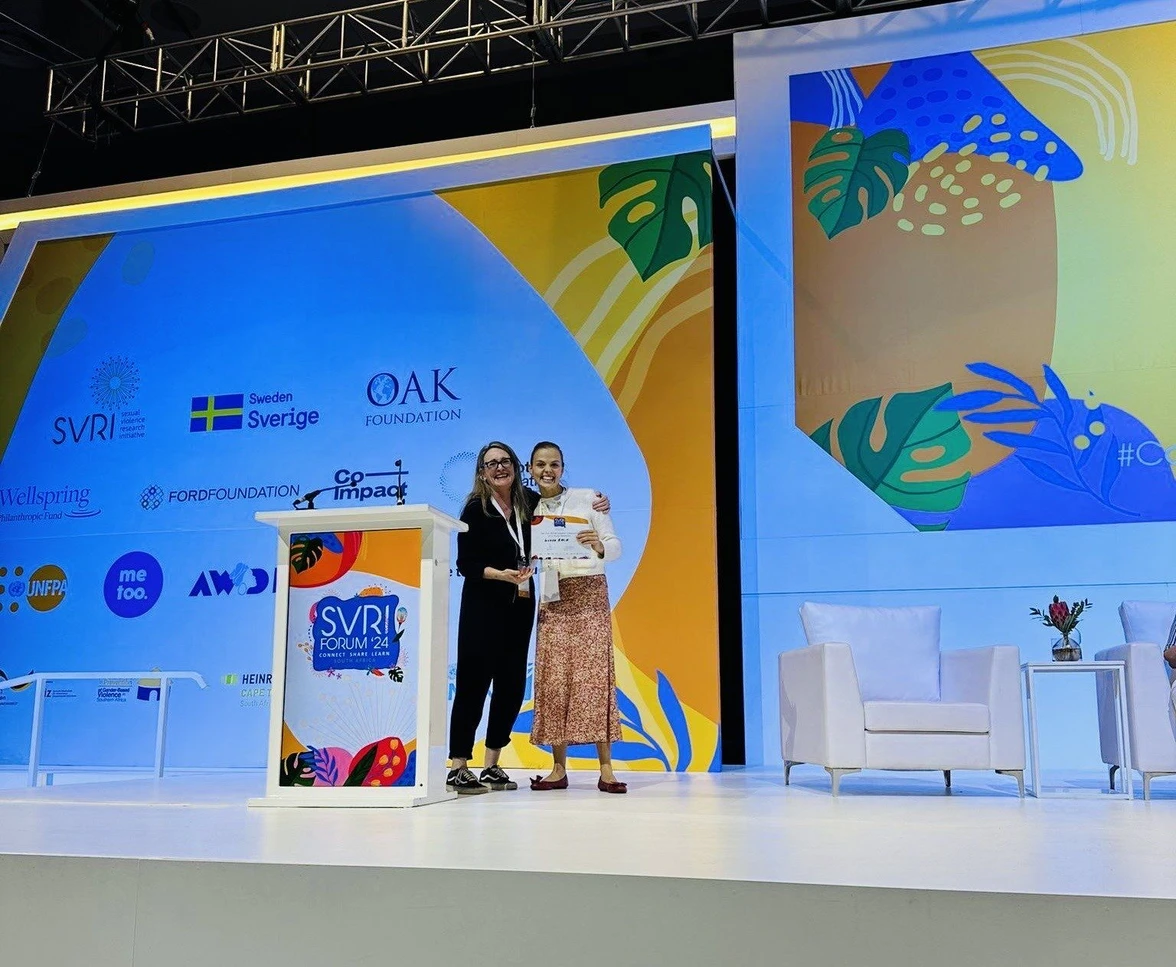
From the 21st of October till the 25th Luise Koch attended the SVRI (sexual violence research initiative) Forum 2024 in Cape Town.
She presented her methodological approach and how science can be advanced to measure the prevalence and impact of online misogyny against female candidates using a quantitative approach.
For her talk she won the award: Best 4-Minute Research Presentation by a Young Researcher.
The Misogyny 2.0 research project hosted a workshop with their partners Kankshi Agarwal and Suki Capobianco at the Munich School for Politics and Public Policy at TUM.
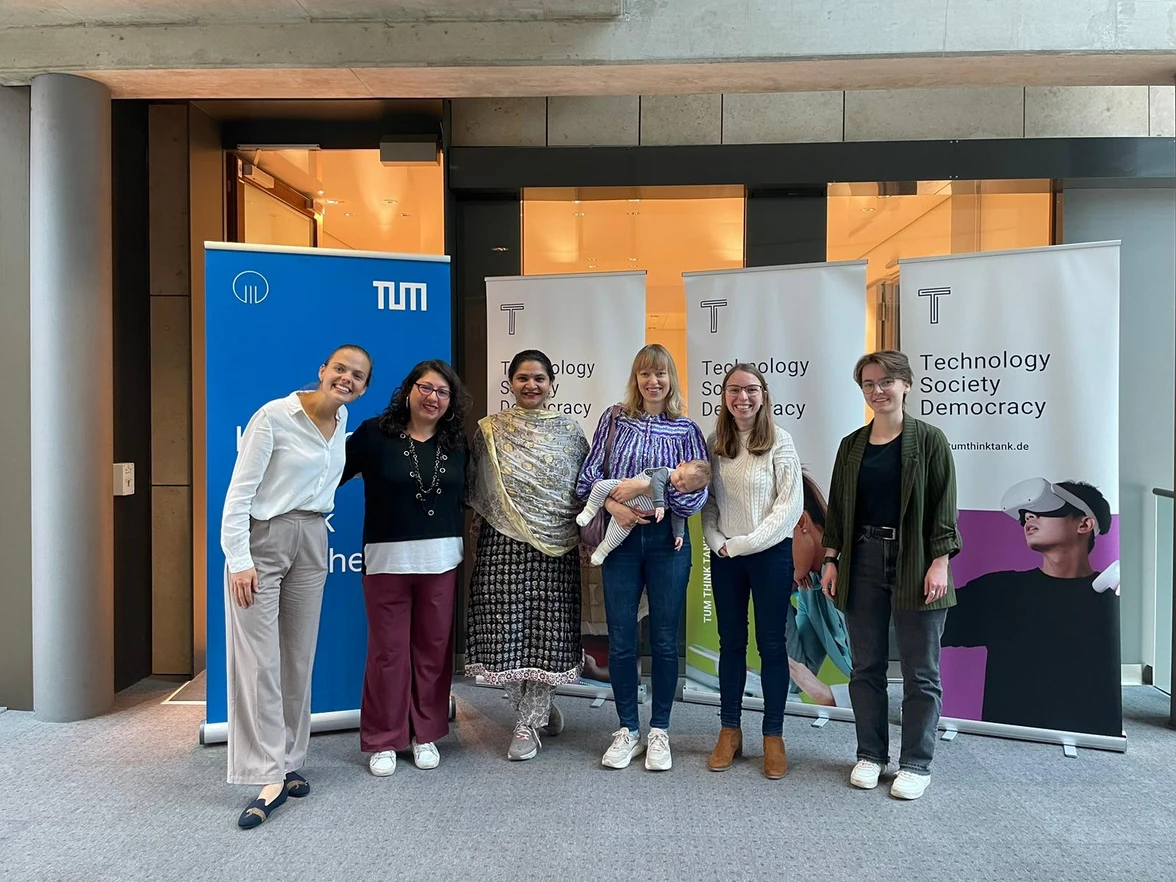
On Monday 26th of September, the project team of the Misogyny 2.0 research project had the honor of hosting a workshop with their partners Kankshi Agarwal (NETRI Foundation, India) and Suki Capobianco (Apolitical Foundation, Germany) at the Munich School for Politics and Public Policy at TUM.
The focus of the meeting was to present and discuss the results of the quantitative and qualitative data collection in the Indian context.Online violence against politically active people remains a key threat to democracy. The groups therefore call for more research and activism on this issue.
This project is kindly funded by the Bavarian Research Institute for Digital Transformation.
Our Brazilian Partner Ladyane Souza gives an interview at the Brazilian National Justice Council on the current state of political violence in Brazil in the light of the upcoming municipal elections
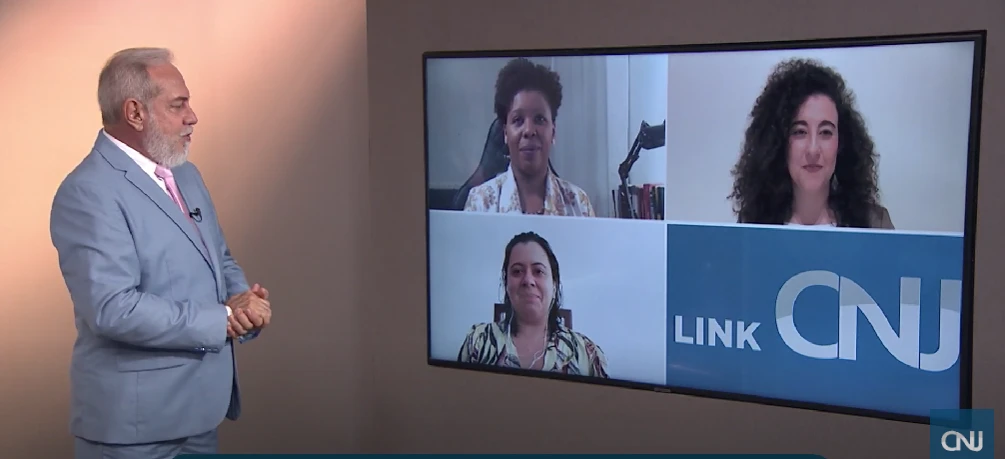
Our Brazilian partner Ladyane Souza, together with Federal Deputy Sâmia Bomfim (PSOL) and Roberta Eugênio, the Executive Secretary of the Ministry of Racial Equality, gave an interview at the Brazilian National Justice Council on the current state of political violence in Brazil in the light of the upcoming municipal elections.
In the interview, Ladyane presents findings from our study, which found that black candidates face a double burden of hatred, both misogynist and racist, and highlights the need for an intersectional lens when approaching the issue of political violence.
Together with the other interviewees, she discusses the law against gendered political violence passed in 2021 and argues for the urgent need for action in the Brazilian context characterised by symbolic violence and impunity. Laws are "important instruments", but society as a whole must denormalise violence against women in order to bring about change.
Our Indian Collaborator Kanksshi Agarwal from NETRI foundation gives TEDx Talk on "Future Politics : Safe, Feminist and A.I. Driven"
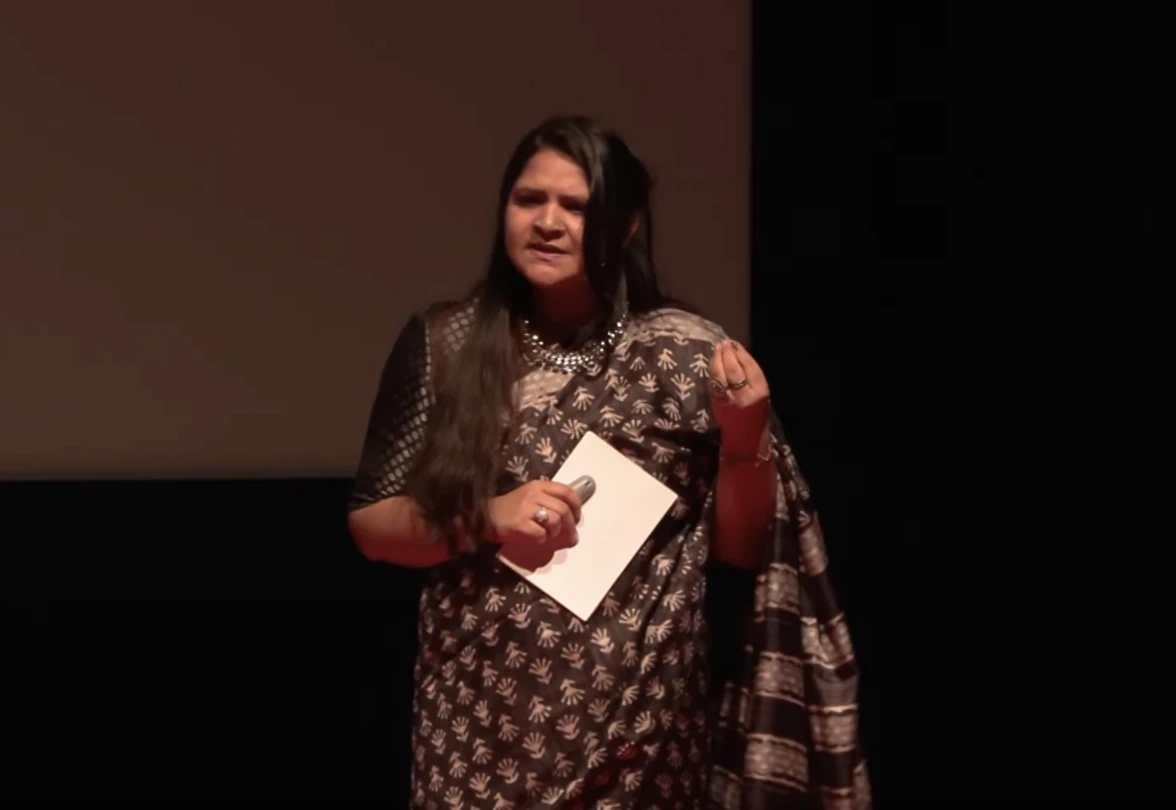
Our Indian collaborating partner Kanksshi Agarwal, Founder of the NETRI foundation gave a TEDx Talk on her vision of AI-driven, feminist politics. In her talk, Kanksshi argues that the field of politics has long been considered as too "dangerous and dirty" for women, which has led to their massive underrepresentation in political decision-making bodies. Against this backdrop, Kanksshi lobbies for a paradigm shift that leverages on AI and systemic feminism to create a more just and secure environment for women to take power.
Prof. Janina Steinert participated in a roundtable on "Strengthening Democracy by Reducing Threats to Women in Politics" at the Blavatnik School of Government, University of Oxford
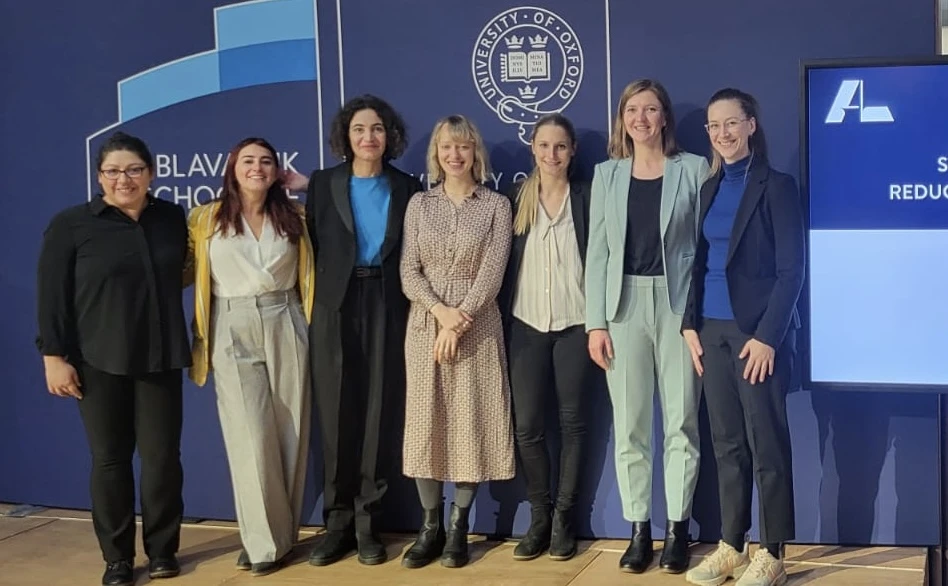
On 25 January 2024, Prof. Janina Steinert participated in a roundtable on "Strengthening Democracy by Reducing Threats to Women in Politics" at the Blavatnik School of Government, University of Oxford. The roundtable was chaired by Professor Ngaire Woods, Founding Dean of the Blavatnik School of Government, and participants included, among others, members from the House of Lords, delegates from HateAid, Apolitical Foundation, the Alfred Landecker Foundation, and the World Wide Web Foundation.
Following the roundtable discussion, Prof. Steinert organised a workshop with the colleagues from HateAid, led by CEO Anna-Lena von Hodenberg, and with Suki Capobianco, Head of Women in Politics at Apolitical Foundation to discuss opportunities for collaboration, including the launch of an online survey among German politicians, journalists and activitsts to better understand their experiences of online abuse, the legal support they receive, and the political consequences of online hate.
Luise Koch and Prof. Sahana Udupa publish new article in Feminist Media Studies on the promise and limits of artificial intelligence in combating online misogyny
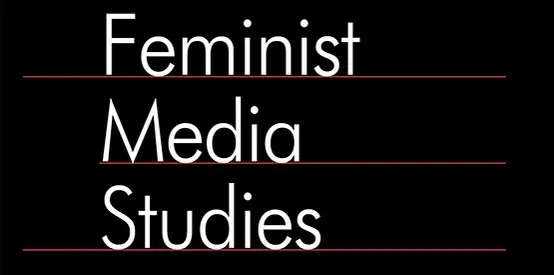
In January 2024, the article “Tackling online misogyny in political campaigns: Promise and limitations of artificial intelligence“ was published in the journal Feminist Media Studies. The article emphasises that artificial intelligence alone is not sufficient to curb misogynistic political campaigns, but that a far-reaching approach and a combination of community-centric moderation system supported by artificial intelligence is necessary.
Studies on the resurgence of right-wing regimes in the Global South have lately offered more evidence for how misogynistic attacks against dissenting voices constitute important elements of populist rhetoric online. A significant recent trend is the active incorporation of gendered narratives within digital influence and disinformation strategies aimed at securing political gains for sponsoring interest groups. Based on the case of online misogyny in Brazil under Bolsonaro, the article probes the promise and limitations of technological solutions, touted especially in the latest wave of excitement around artificial intelligence, in addressing emerging forms of gendered speech. Luise Koch and Sahana Udupa suggests that a far-reaching approach to misogynistic political campaigns requires that nuanced message-level intervention in terms of community-centric artificial intelligence-assisted moderation systems should be combined with measures to disrupt online and offline networks that right-wing regimes have raised to spread disinformation and extreme speech.
The full article is available to read and download on the publisher's website. The study received funding from the Bavarian Institute for Digital Transformation (bidt) as part of the project "Understanding, detecting and mitigating online misogyny against politically active women".
Luise Koch and Raji Ghawi publish paper on political violence in the Electoral Study Journal from the Brazilian electoral Supreme Court.
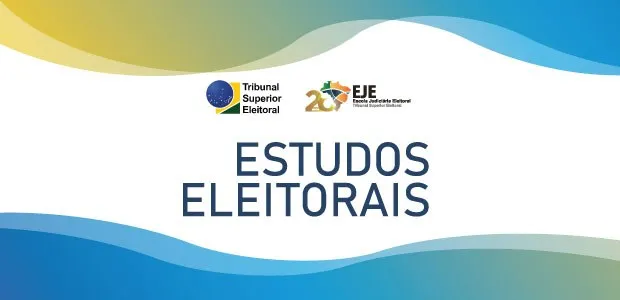
Political candidates who engage in discussions on social media during a campaign period are frequently faced with online hate speech. The extent and the different layers of this form of online misogyny as well as the potential implications for certain candidates are discussed in the paper.
While male and female candidates generally receive comparable amounts of online hate, this study revealed that when looking at female candidates solely, black candidates are faced with a double burden of hate being of both misogynistic and racist nature.
Using a mixed-method approach together with Ladyane Souza and Maria Paula Russo Riva we find that female candidates receive large amounts of toxic replies under their Twitter posts. A qualitative manual annotation of the tweets allowed us to identify replies not only with misogynistic content as was the case for the white counterparts, but combinations with racist attacks for black candidates. In the run for an election in which black candidates are already underrepresented and often lack adequate support mechanisms, this targeted kind of hate is a threat to democracy.
The research project "Understanding, Detecting, and Mitigating Online Misogyny Against Politically Active Women" under which the paper was published, is kindly supported by the Bavarian Research Institute for Digital Transformation.
Prof. Janina Steinert awarded with ERC Starting Grant
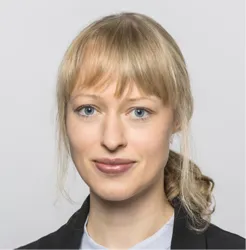
Out of 2696 applications for the 400 ERC Starting Grants of the European Research Council Prof. Janina Steinert's project proposal "Disentangling and Preventing Economic Violence against Women" was selected. In the project she will investigate economic violence against women:
Physical and sexual violence against women by a partner has been the subject of many studies. However, an important dimension of intimate partner violence has been neglected: economic abuse. This includes denying women the right to participate in financial decisions, confiscating their income or preventing them from seeking employment. In the project Disentangling and Preventing Economic Violence against Women (ECOVI), Prof. Janina Steinert aims to determine the extent of economic abuse of women. She will investigate the causes of this phenomenon and how it relates to other types of intimate partner violence. In addition, she aims to develop and test preventive measures. The project will focus on the situation in India as an example.
The Hochschule für Politik article can be found here.
The TU Munich central press release can be found here.
The European Research Council's Europe-wide announcement of the awarded projects can be found here.
Reading and Talk with Sawsan Chebli
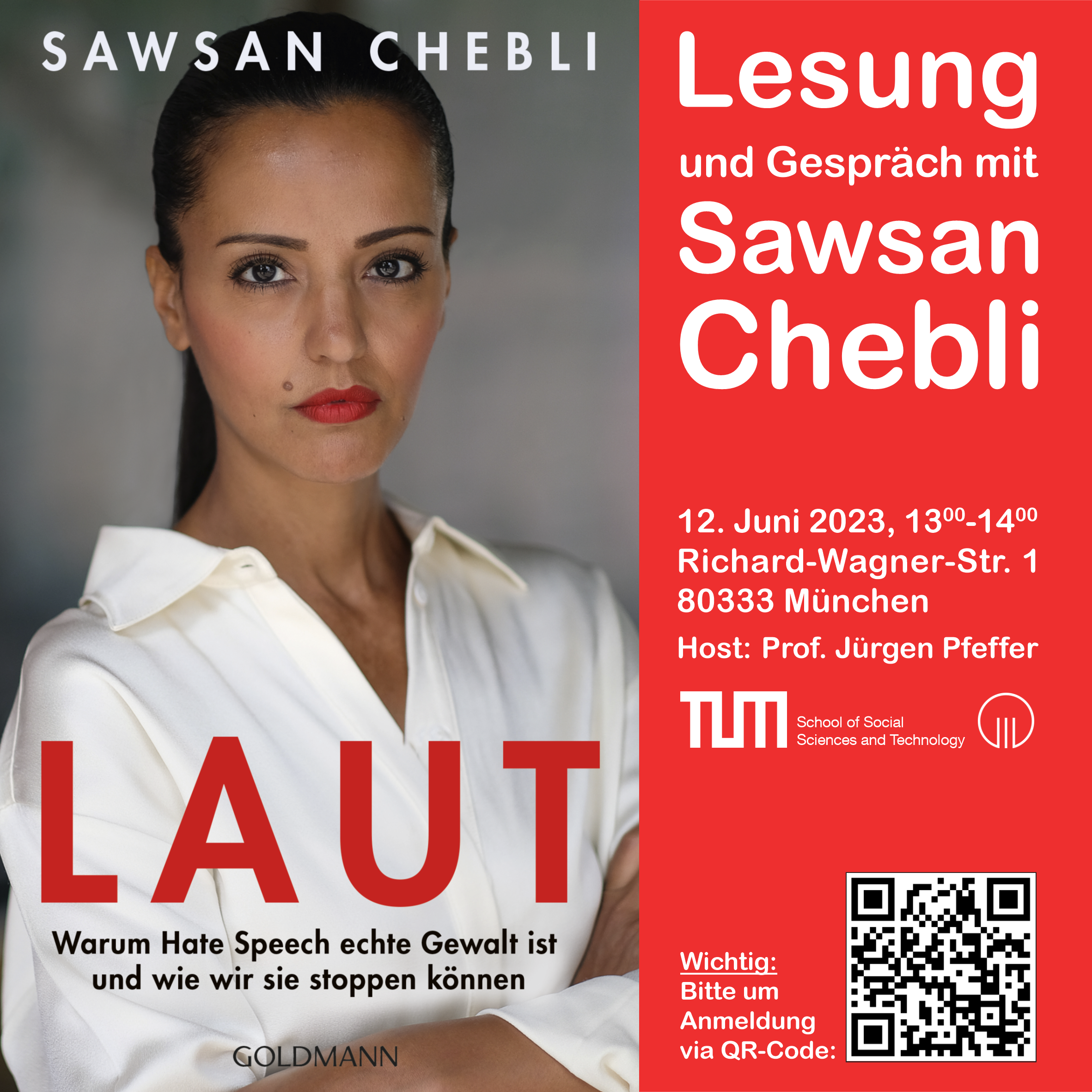
On the 12.06.23 Sawsan Chebli's visited TUM for a reading and conversation regarding her new book "Laut - Warum Hate Speech echte Gewalt ist und wie wir sie stoppen können" (eng.: Loud - Why hate speech is real violance and how to stop it).
In her book and in the conversation between her, Prof. Jürgen Pfeffer and the audience she gave valuable insights into online hate and her experiences with it, as well as online violence specifically targeting women, migrants and politicians.
You can find out more about the event here.
Online Hate against Members of the European Parliament
The research study conducted by Prof. Janina Steinert, Luise Koch and Prof. Jürgen Pfeffer assessed the extent and nature of online hate that Members of the European Parliament are exposed to and to understand their emotional and political reactions to the hate they receive. To this end, a short online survey was circulated among all Members of the European Parliament in February 2023.
The findings drawn from the survey suggest that female politicians are facing a highly gendered and sexualized kind of hate online, also referred to as online misogyny.
You can find the study here.
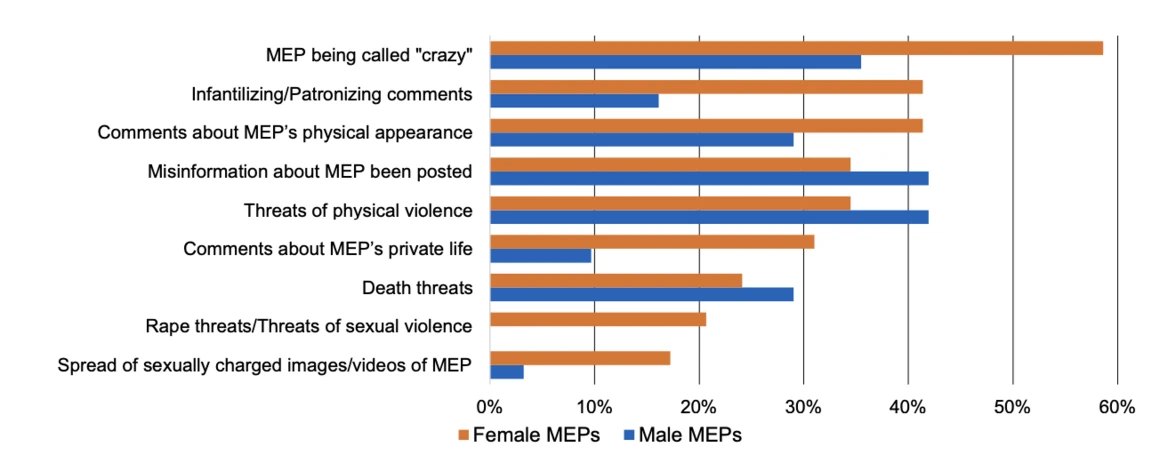
Prof. Janina Steinert, Prof. Jürgen Pfeffer and Luise Koch co-host discussion on online misogyny at the European Parliament
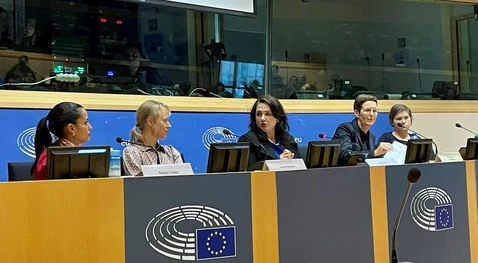
Women who are politically active in social media are frequently faced with online hate speech. The extent and causes of this form of misogyny as well as possible countermeasures were addressed in a discussion event in Brussels on March 21. Prof. Dr. Janina Steinert presented a survey conducted among Members of the European Parliament.
While male and female parliamentarians generally receive comparable amounts of online hate, the survey revealed that the kind of hate received is highly gendered. Female parliamentarians were more likely to receive sexualised forms of online hate, including rape threats. Furthermore, male and female parliamentarians react differently to the online attacks they receive. Online hate appears to place a higher emotional burden on female targets as they were more likely to feel stressed, intimidated and belittled. Overall, hate attacks appear to have more detrimental political consequences for female parliamentarians, resulting in a silencing effect on the politicians. The topic was discussed with Members of the European Parliament and Helena Dalli, the EU Commissioner for Equality, along with researchers and authors.
The event was hosted by the professorships for Global Health (Prof. Janina Steinert) and for Computational Social Science and Big Data (Prof. Jürgen Pfeffer), by the S&D and Green/ EFA groups in the European Parliament.
The two professorships lead the research project "Understanding, Detecting, and Mitigating Online Misogyny Against Politically Active Women" with Prof. Sahana Udupa from the LMU Munich.
Protecting Women Politicians from Online Abuse

Why do some female candidates and victims of online violence drop out of politics while others endure? With Natália Leal, Maria Paula Russo and Ladyane Souza Luise Koch investigates and finds: there is no simple answer.
Read the article "Protecting Women Politicians from Online Abuse" published by "Online Violence at a Glance" here.
Brazilian experts
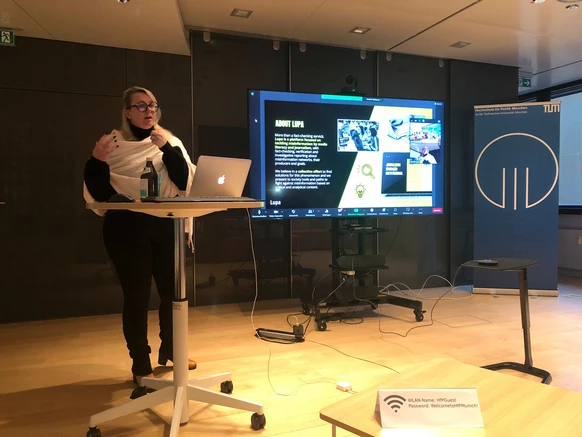
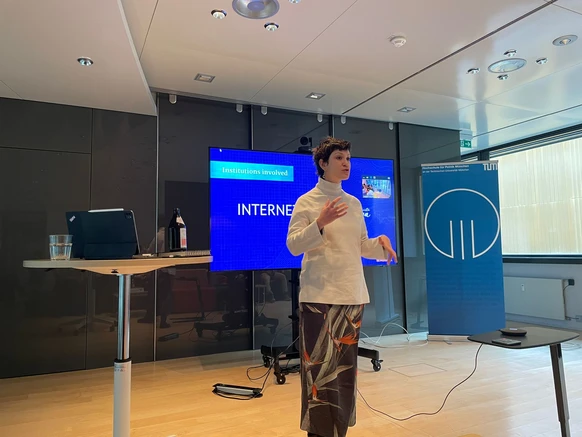
During the enriching visit of our Brazilian experts, Natália Leal, Maria Paula Riva and Mariana Valente several insights and challenges about the Brazilian online misogyny background were discussed. The highlight was the two expert talks on online misogyny during the Brazilian election campaign. Natália Leal spoke about the great input on the fact-checking work by Agência Lupa, the first independent fact-checking organisation in Brazil, to fight misinformation during the Brazilian election campaign. Mariana Valente gave a very insightful talk on gender-based violence against female politicians in Brazil and the important work of the multidisciplinary research centre InternetLab. Thank you for joining!
Gender Innovation Camp
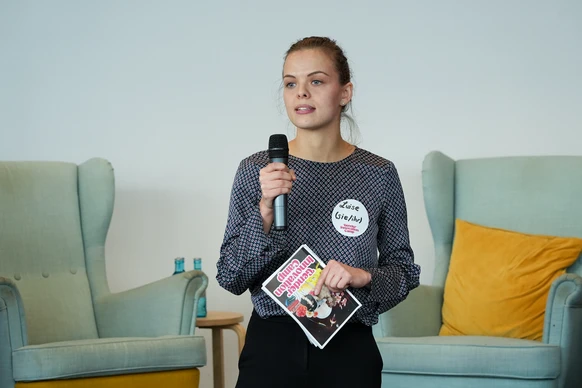
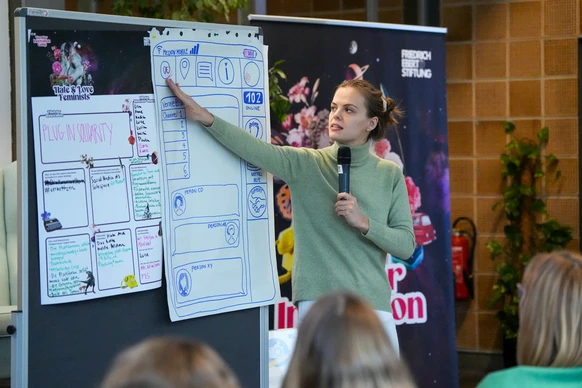
Our PhD student Luise Koch led one of the six working rooms at the “Gender Innovation Camp” hosted by the Friedrich Ebert Foundation in Berlin. During the two-day event, Luise involved stakeholders and civil society to discuss support solutions for politically active women who face online gender-based violence. The inclusion of these key figures turned out to be crucial and resulted in the concretization of the idea of a low-tech online platform. The proposed “Plug-In Solidarity” innovation idea aims to offer networking opportunities for women who have experienced online hate and disseminate information such as successful practices or reliable coping methods. The idea was awarded a one-year follow-up support from the Friedrich Ebert Foundation. More information about the overarching project aiming at detecting, understanding and mitigating online misogyny against politically active women can be found here: https://www.gov.sot.tum.de/gov/projects/misogyny-20/project/
Regional experts

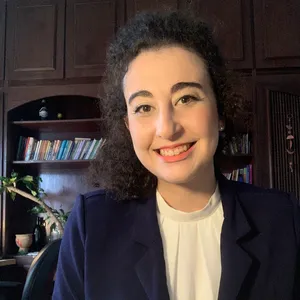
Our activities are supported by two Brazilian consultants, Maria Paula Riva and Ladyane Souza, who are helping to compile an ever-adapting list of male and female politicians and political activists in Brazil, drawing on their regional expertise. They have also helped to finalise the list of regional and national candidates running for the upcoming elections in October 2022 and will continue supporting the project with regional insight into the political context, online media expansion and gender-based violence in Brazil.
Interview - Sahana Udupa
In an interview for the Brazilian news organization, Aos Fatos, Sahana Udupa spoke with Ethel Rudnitzki to highlight the challenges of online content moderation especially during election times. The interview was published as part of a series of reports Aos Fatos has published in the runup to the presidential elections in the country. Aos Fatos focuses on fact-checking and investigates disinformation and misinformation networks on social media.
27.07.2022
Interview - Janina Steinert
In an interview with the German scientific magazine, Spektrum, Janina Steinert spoke with Sina Horsthemke about gender-based violence in Germany, discussed a range of risk factors for violence against women, including economic dependency and poor mental health, and outlined how civil society can better support survivors of violence.
26.07.2022
Sunbelt 2022
Talk at Sunbelt 2022, the XLII Social Networks Conference of the International Network for Social Network Analysis (INSNA) - (Session 78-1. Networks of Polarization):
Measuring dimensions of gendered hate in social media networks
Wienke Strathern, Jürgen Pfeffer
Meeting with Evelyn Regner - Vice President of the European Parliament
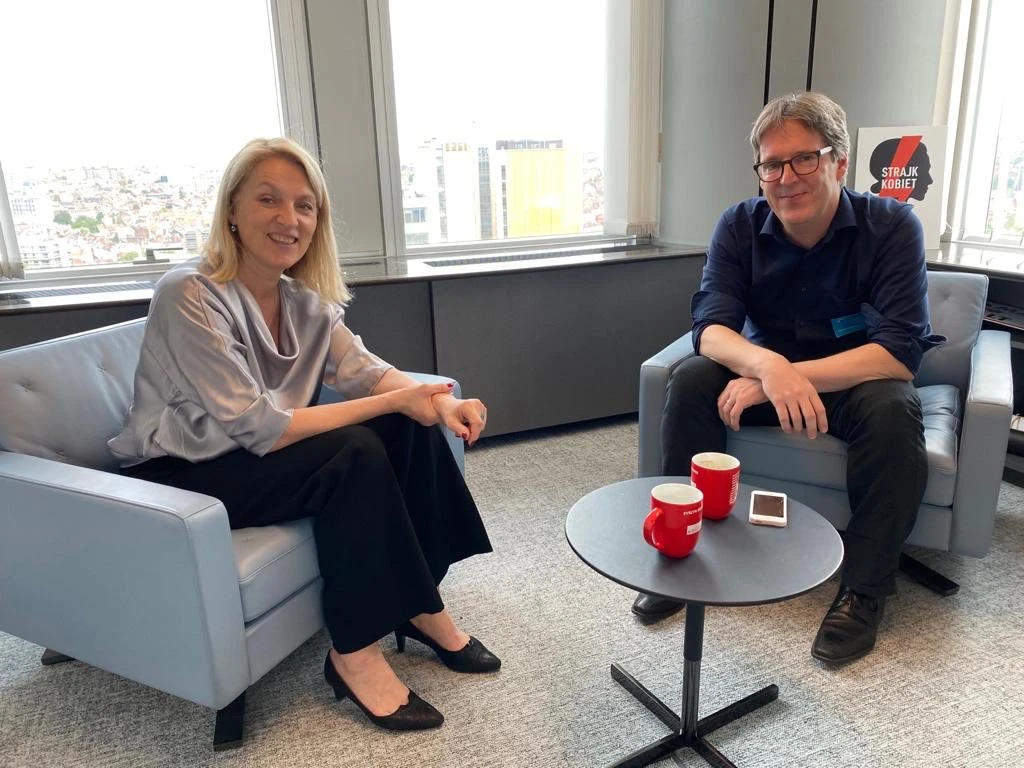
10.05.2022: Meeting to talk about AI regulation and online misogny.